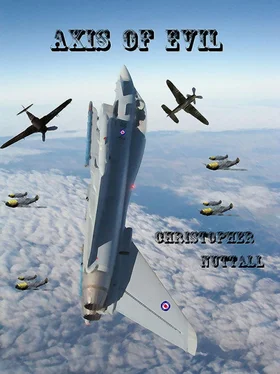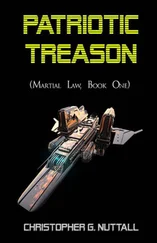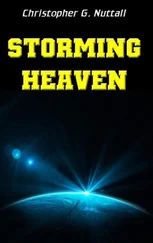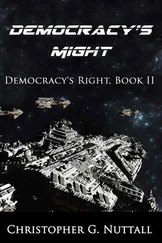“It’s like a bloody fortress in here,” Truman said. “Can we retake Washington?”
“That’s rather up to our friends,” Palter said. “For now… we’re safe.”
* * *
The Secret Service man was carrying a pistol. It looked a toy next to the AK-47s that Buckley and his men were carrying. His air of grim determination completely failed to awe Buckley, who had seen worse from drill sergeants in the first war.
“What the hell are you people doing here?” The Secret Service man demanded. “Leave at once…”
He broke off as Buckley pointed his AK-47 at his chest. “This is your only choice,” Buckley said calmly. “You can surrender now, along with your men, or you can die.”
“Fuck you,” the man snapped, lifting his pistol. Buckley shot him once, the other men opened fire on the other Secret Service men. The battle was short, sharp, and preordained. Buckley lost only three men.
“Move in,” he snapped. “Gary, you secure the rear; Todd, Wally, you get the sides. Everyone else, you’re with me!”
He ran forward, crossing the lawn and kicking in the main doors with a grenade. The explosion shattered the doors and he forced his way forward, fanning the men around the ground floor. It was vital that it be secured before the upper floors could be taken.
“Secure the ground floor,” he snapped, and then a bullet cracked past him, striking one of his men. The Secret Service had rallied, sending men to fight him. He fired back madly; shooting bursts through the defenders, his men spreading out behind him. “Die, you idiots.”
“Grenade,” his second shouted, tossing a grenade up the stairs. The explosion shattered the stairs, blasting the hastily improvised barricade down and slaughtering the defenders. He ran forward, his men leap-hopping each other as they moved forward, using their grenades whenever the defenders built a barricade.
“The Oval Office,” his guide snapped. The final doors lay in front of them; the men fell quiet. Buckley stepped forward, watching for a trap, and pushed the door open gently with his weapon’s butt. It opened easily; the core of American power was at their mercy.
“You know, if you want to petition for redress of grievances, there are other ways to do it,” a man’s voice remarked. It was very familiar from the fireside radio chats he’d heard on the radio. It took them moments to connect the strong voice with the weak form sitting in a wheelchair, shaking his head sadly at them.
“President Roosevelt?” Buckley asked, stunned. Hardly anyone had known that Roosevelt was wheelchair-bound.
The dry voice was wracked with pain. “You were expecting Abraham Lincoln?” Roosevelt asked. You have to stop this!”
“You lead us to ruin,” Buckley’s aide snapped. “Why didn’t you send in the army to punish the niggers?”
“They had grievances against you too,” Roosevelt said. His voice was harsher, coming through pain. “You saw them as nothing, but inferiors, lynched them, raped them…”
He coughed. “I never wanted to abandon anyone,” he said, though hoarse breaths. “For America to progress, the entire people had to progress, even black folk. Yet it was hard; no matter what your fool of a general tells you, the President is not all-powerful. Press on one group, they press back. Tax the rich too highly, they go elsewhere and close factories. Tax the poor, who don’t have much money, and you get riots. Convince managers and unions to balance, instead of one crushing the other and destroying entire factories because of the demands.”
“My boss laid me off when he left the country,” one of Buckley’s men snapped. “You didn’t force him to give me a job.”
“And did you join a Union?” Roosevelt asked. He coughed; Buckley saw blood on his sleeve. “If you pay the employees too much, the employers have less money to invest in new materials and…”
His voice broke off. “Please,” he said, each word an effort. “Don’t destroy America and…”
He slumped in his wheelchair. By the time a doctor reached the White House, it was too late. President Roosevelt, President of the United States of America, was dead.
Chapter Forty: Twenty-Four Hours
Ten Downing Street
London, United Kingdom
24 thJune 1941
Hanover stared at McLachlan. “What the hell is happening in America?” He demanded. “They’re doing what?”
“It’s a coup,” McLachlan said. “They’ve confined our staff to the embassy.”
Hanover gaped at him. “I don’t believe it,” he said. “It’s not in the American tradition to have coups! They’re not some banana republic, are they?” McLachlan shook his head. “What’s happening over there?”
“I’m not quite sure,” McLachlan admitted. “All I know is that something went badly wrong in Washington, then a group attacked the White House… and then silence. Ambassador Quinn is panicking.”
“And we never had a sniff of anything,” Hanover said thoughtfully. “Shit.”
“Sir, you know how badly America has been suffering since the Transition,” McLachlan said. “This could be an attempt to prevent progress.”
Hanover nodded. “Perhaps,” he agreed. “So, what’s happening?”
“I don’t know, no one’s confessed to anything,” McLachlan said. “Our agents in place are reporting major confusion, but the coup masters haven’t shown their hand. There’s been no attempt to broadcast to the nation, or anything like that.”
“General Cunningham reported that General Patton is going spare,” Hanover said. “He was demanding that we ask the Canadians to tell us what’s going on.”
“Something’s gone off the rails somewhere, that’s for sure,” McLachlan said. “And there’s the radioactive debris in New York. Where the hell did that come from?”
“Our attack,” Hanover snapped. “We told them how to do it, for fuck’s sake!” His voice darkened. “Those blasted backbenchers!”
McLachlan scowled. The backbenches had staged a revolt, demanding that the British tell the Germans how to clean up a nuclear site, which had been done. As soon as the debris in New York had been checked, it had been proven to have come from a standard detonation signature from a British weapon, and only one had been used since the Transition.
Hanover paced angrily. “How bad is it going to be in New York?”
“It’s still burning,” McLachlan said. “The blast looked like a nuclear blast on the satellites. It levelled nearly three kilometres around ground zero, so that’s immense damage done to Manhattan and Jersey City. The death toll is going to be huge.” He made a face. “And, of course, there is the radioactive damage. It’s nowhere near as high as the attacks in Paris, or an neutron bomb attack, but a lot of people are going to be suffering in the future.”
“And the Soviets were involved,” Hanover said. “Well, well.”
“Apparently so,” McLachlan said. They exchanged glances. “Prime Minister, this is a weapon of mass destruction used against a civilian target, in one of our ally’s cities. Are we not obliged to retaliate?”
“Yes, but against whom?” Hanover asked. “The Russians or the Germans? If so, where do we hit?”
“The Russians,” McLachlan said. “They’re certainly the most guilty ones. It was their ship, after all.” They exchanged a second glance. “As for the target… Basra or Baghdad are both occupied by Russian troops, and they’ve purged most of the civilians from the cities. Either one would…”
“Ruin our relations with the Arabs,” Hanover said. “Tactically, yes; strategically, no. We need somewhere useful for strategic purposes.” He scowled. “ Their oil wells, or their factories, might make good targets.”
Читать дальше












